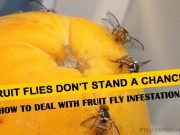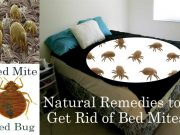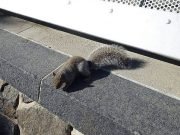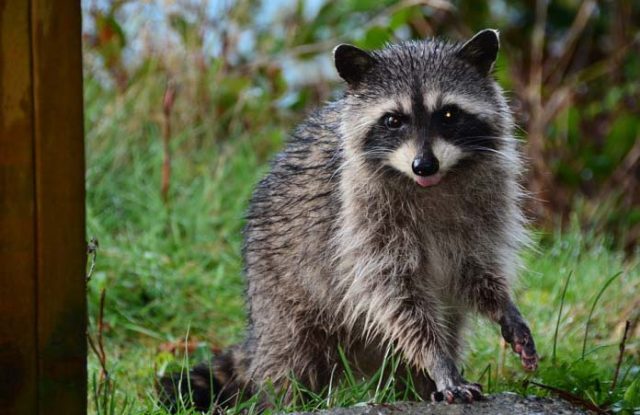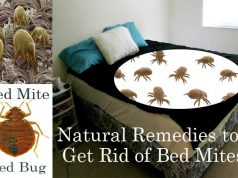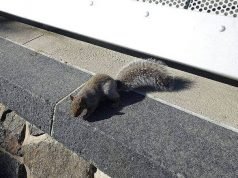Raccoons can be a severe crisis at home. Unfortunately, you may not notice them until there is a huge problem and it becomes complicated to get rid of them. Raccoons are found in the middle of towns and cities too. Raccoons can cause a great deal of destruction, contaminate food, and even carry disease.
How to keep raccoons away from your backyards, gardens, and attics?
There are many ways to control raccoons, including taking steps for prevention, trapping and using homemade raccoon repellents. Though raccoons are not rodents, many of the methods used to control raccoons are similar to those used against rats, mice, and squirrels. Of course, the most humane, and often the most effective methods are prevention and exclusion.
Raccoons are commonly found in areas near to water bodies where significant garbage dumping takes place. Raccoons, being omnivores, eat meat, fish, vegetables, and anything they get for that matter.
Are raccoons dangerous?
Raccoons normally don’t cause trouble. But at times, they can make life difficult for the humans in their search for food and shelter.
How to scare away raccoons?
A very important thing that one must understand while trying to exterminate raccoons is that there is always something that attracts them to your property. Eliminate these attractions or make them inaccessible. Scaring raccoons away is like curing the symptoms of a disease without eliminating the cause of it. If raccoons are visiting your house, it is definitely not by chance. Though scaring raccoons may be a quick fix to your immediate problem, you should not waste your time doing this. Instead, one must act immediately to treat the disease once and for all by making your house unappealing for raccoons.
1. Trapping raccoons
Raccoon trap is the best method for raccoon removal. If one needs to remove raccoons in the best humane way, a trap is the best possible option. You need to exercise utmost care in choosing a trap according to their crawl space. Look for a trap that is at least 12″x12″x32″. The trap should be strong enough to withstand the struggle of raccoons. Try to keep a brick or some weight in order to prevent raccoons from escaping from the trap. As raccoons are omnivorous, you can choose any bait, from a wide variety of foods, like tuna, marshmallows, most fruits, berries etc.
Where to keep the trap?
Try to keep multiple traps. Create a trail for raccoons from outside your property and right in to the trap. Keep pieces of foods along the trail that will lead to the trap. Always wear gloves while setting up the trap and trail, Raccoons may get wary of the human scent and not come close to the trap at all.
2. Protect your trash
What is the attraction for a raccoon to your home? That’s the first thing that you must find out. Raccoons may visit your home for your pet’s food or any form of edible garbage.
Whatever methods that you employ, if you fail to clear your own yard of food waste and edible garbage, you can’t stop them from creating ruckus.
You have to keep the garbage cans well protected from them. Even if you use the community garbage bin, it is highly recommended to use a solid metal trash can, some bungee cords and cinder blocks along with it. You can lid down the garbage bag using bungee cords, cover it up, and place the cinder above the trash can. Remember, wastes like meat, fish etc. produce strong smells that are to the raccoons. So,you need to protect your trash to hopefully ward off the evil raccoon’s visit.
3. Keep your yard clean and free of raccoon fodder
The next important step to keep away raccoons is keeping your yard clean. After protecting the garbage bag, clean up the yard of any food wastes or pet food. Pet food is a delicious meal for famished raccoons. Raccoon attacks are found to be on the higher side in the yards where pets are around. So, don’t keep any pet food outside your home over the night.
If there are any fruit producing plants in your yard, make sure that there are no unattended fallen fruits. They may rot on the ground and create odors that will invite raccoons.
You can also try bringing in the bird feeders from your yard. Bird feeders and anything like fallen fruits or pet food waste may keep your yard an exciting hunt for the raccoons.
If your yard is clean of everything that a raccoon might be interested in, there is minimum reason for the raccoons to visit your property.
4. Setting up electric fences across your walls
Raccoons are great climbers. They can easily climb up any kind of the normal fence and thus reach your yard. So, a normal fence is not sufficient for preventing the raccoons’ entry. Either it should be too high for the raccoons to climb or should be electrically powered.
Another fact is that raccoons are good at digging. They can easily sneak beneath the fence in your yard. So here, an electric fence can be the most efficient idea. An electric wire installed six inches above the ground and second wire a bit higher – the work is done. When raccoons touch the wires, they get a mild shock and give up on any further attempts to enter the yard. An electric fence compared to a classic fence is a great option to keep away raccoons.
Raccoons can stay in your premises, without you even noticing it. So clear away covers like wood stock, wood piles, old logs, any brushes etc.
5. Employ ‘scare’ tactics
You can also scare away raccoons by using some devices, mostly motion activated, which will scare them away. But the problem is that raccoons may easily adapt to the device and eventually infer that the device won’t cause any harm, and will venture back in. Here you can try changing the devices in a short span of time so that the raccoons don’t get accustomed. There are many options for motion activated devices, including floodlights, radio’s ultrasonic sound, voice producers etc. Floodlights can be the best option, as they directly interfere with natural tendency of raccoons to operate in dark.
6. Ammonia
Raccoons are very smart animals;they can enter into your house and make their den in your yard. This is the worst case and it may even get dangerous if there are baby raccoons in those dens. Raccoons can create their home in vents, fan openings, chimney, garage, deck, roof etc.
They are fairly clean animals. They don’t defecate in their dens.
They usually keep themselves clean and neat.
The smell of ammonia, however, is a great deterrent for raccoons. It’s recommended to keep towels soaked in urine at places where you suspect a raccoon den to exist. Ammonia is abundant in urine. So, the smell of it will cause raccoons to believe their place has become soiled. This, in turn, will cause discomfort to them and lead them to abandon their den.
This is not a permanent fix, as they can return after a period of time. So, this method can’t be considered a constant solution, but rather an immediate one.
7. Predator urine
Another method that can be used to deter raccoons is in the form of a product you can purchase through most online stores and retailers. Raccoons are terrified of predators like wolves and mountain lions. This method manipulates their sense of smell and tricks them into believing that predators are nearby. You have to look for urine from mountain lions, wolves, bobcat etc. for this to work. Though effective, this method again is a temporary solution, particularly because you’d not want to keep pouring animal urine across your house and surroundings.
8. Cayenne Pepper solution
First, boil 1 cup of cayenne pepper with 4-5 cups of habanero chillies in water. Let the solution cool down. Now spray it in areas through which raccoons may possibly enter, like holes, openings in fences, drainage et cetera. You may also use a coating of the solution on your garbage can. This spray repels raccoons as they are much irritated by cayenne spray.
9. A Sprinkler
Much like motion activated devices, a sprinkler will cause raccoons to be scared, confused, and hence, willing to leave your garden for better and safer grounds. When a raccoon approaches the place where a sprinkler is kept, the speedy motion of the device will create noises which will scare them away. Also, because they’ll be drenched in water, they’ll be easily befuddled, and consider it appropriate to retreat.
10. Dogs
If you have a burly dog as your pet, its presence will naturally repel the raccoons from your premises. The dog’s smell and constant activity will make it impossible for them to infest your property. A vigilant dog will easily make them flee. Though it is an effective means, there is always an element of danger as the dog may get attacked when the raccoons get aggressive. This is highly unlikely, but must still be considered before making this a choice.
Now that we’ve covered some natural methods of getting rid of raccoons from your yards and attics, let’s share the answers to some frequently asked questions about raccoons.
Do raccoons attack humans?
Raccoons visit your home and yard for mainly two purposes. One is food and the other is a shelter. Raccoons look for food in dark places; pet foods especially make good meals for raccoons. So, you need to clear your home of any food that is being left unattended.
Raccoons can inhabit your place even without you noticing. They can stay in your wood stock, chimney and even the garage. Raccoons can be very protective about their baby raccoons. So, if you are trying to clear the yard of raccoons, deal very cautiously with baby raccoons.
Do raccoons attack pets?
Raccoons are wild animals, there is a great possibility that your pets and raccoons may get into a conflict, especially when the raccoons feel trapped. Thousands of such cases are reported in the USA every year.
Cats and dogs have this tendency to chase raccoons at sight. Especially, dogs chase raccoons out of curiosity or to protect their yard. Normally, raccoons try to flee away. But in some cases where they feel trapped, they may attack cats and dogs.
Raccoons are very fond of your pet’s food, especially eggs. Once they find delicious food kept for your pet that may trigger a fight between your pet and the raccoons.
Raccoons have sharp claws and teeth, and are capable of injuring your pet severely. Medium and big sized pets may fight back and protect themselves. But there is a larger chance for the small pets to get killed. Also, medium and big sized pets may get ruthlessly injured.
Once you find raccoons in your yard or neighbourhood, it is advised to take special care of your pets.
Will Raccoons eat chicken?
Raccoons are omnivorous animals. They can venture into your yard and eat your chicken, especially because eggs are a delicious meal for raccoons.
Raccoons are very good climbers of fences and are even reported to have opened simple locks of chicken coops. So, you need to protect the chicken coop with latches and strong locks.
Raccoons are mostly nocturnal (feed at night) animals. But protecting your area in the daytime with an electric fence may be a good solution.
Are raccoons rabies carriers?
A survey revealed that 32% of the raccoons are rabies carriers. Cases where racoon infestations aggravate intorabies may be a rare event, but there still is potential danger to humans and pets. Raccoons can spread rabies by biting or causing a scratch. If you or your pet has been attacked by a raccoon, it is highly advised to take proper medical treatment as soon as possible.
Is Raccoon faeces dangerous?
Raccoon feces in your area can be another problem. It has many bacteria and worms in it, which can cause serious health issues. Therefore, much care should be taken to remove it and dispose it at the earliest. Raccoons’ feces is a primary host for a harmful roundworm called Baylisascaris procyonis. So, people who are exposed to raccoon’s faeces are potentially at risk.It may also have leptospirosis and salmonella which can be dangerous to humans and pets. If Raccoon feces is once found, the area needs to be properly disinfected.
Is raccoon damage covered by insurance?
Interestingly, as raccoons are members of the bear family, the harm caused by them doesn’t fall under the rodent/vermin rejection clause of most insurance policies and therefore you can claim insurance money for their attacks. Though this news might give you some relief, anyone would prefer these animal gypsies out of their households.
Concluding Remarks
Raccoons, even though harmless as long as they’re left unthreatened, can not only cause property damage, but also can become a cause of diseases to your pets, kids, and you. It’s best to be on the watch for these creatures, particularly if your house has a large garden space, backyard, and old attics.



















